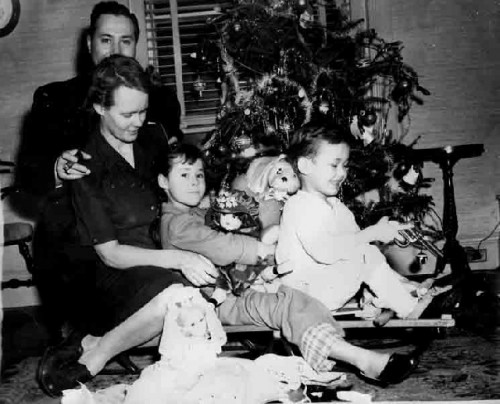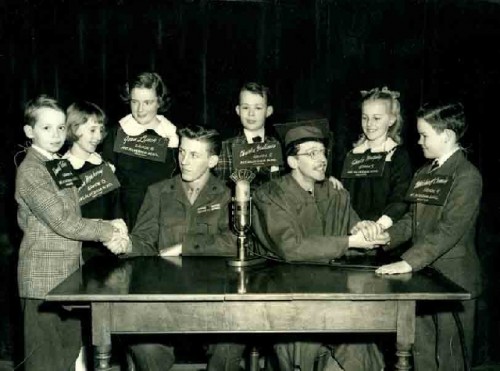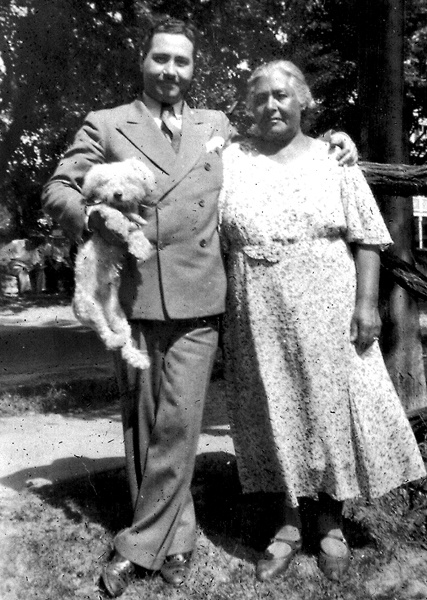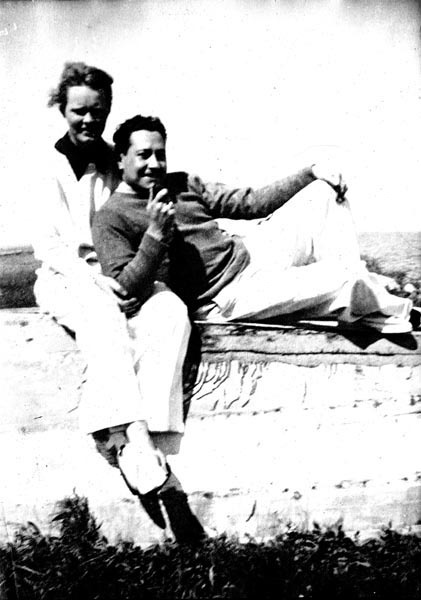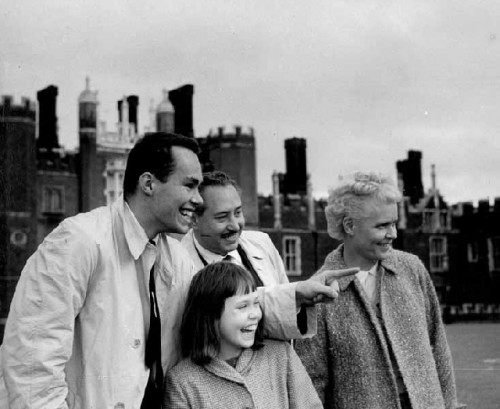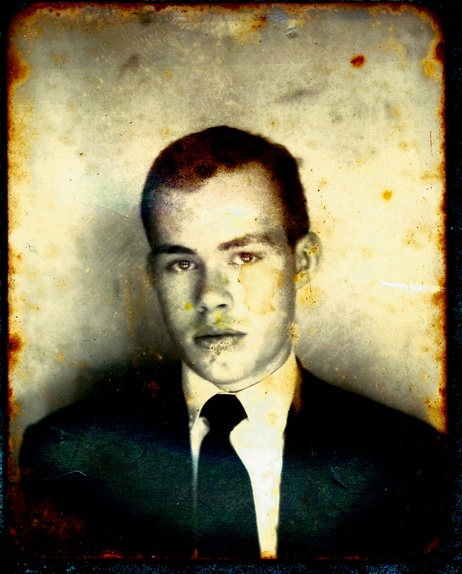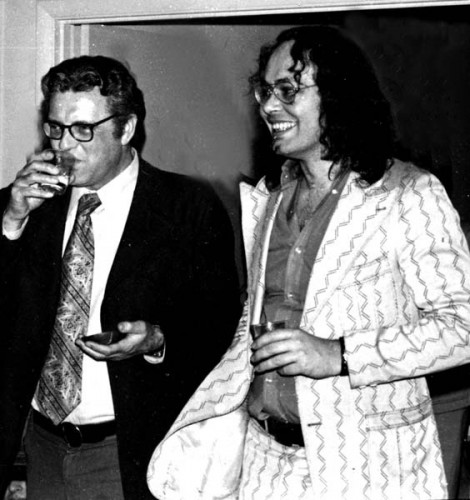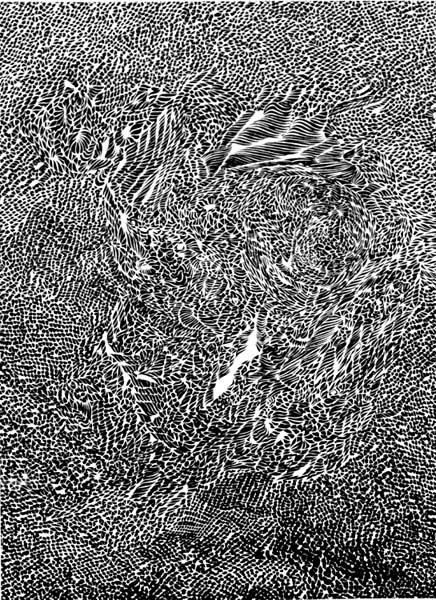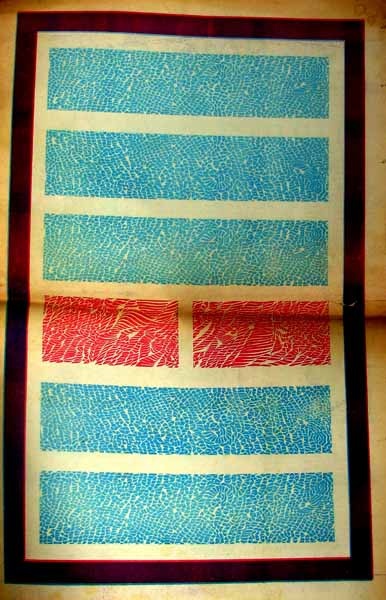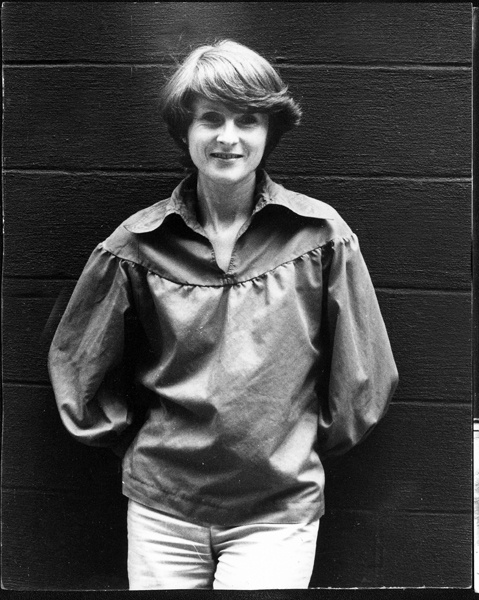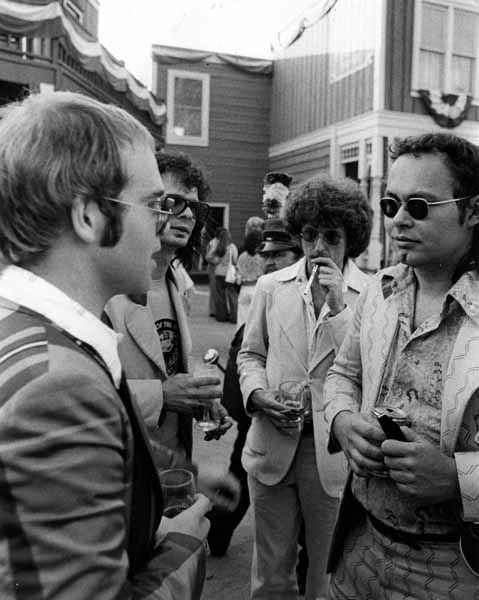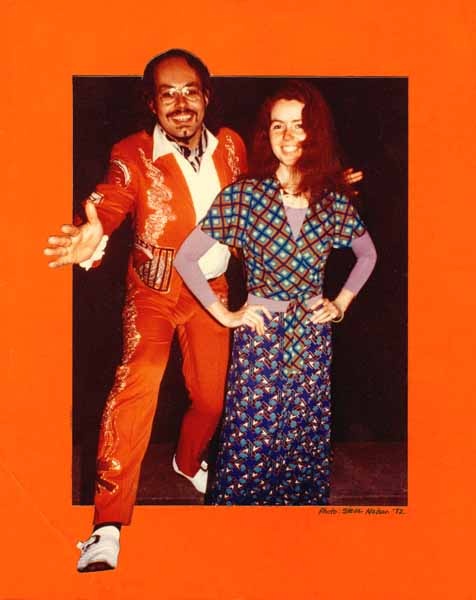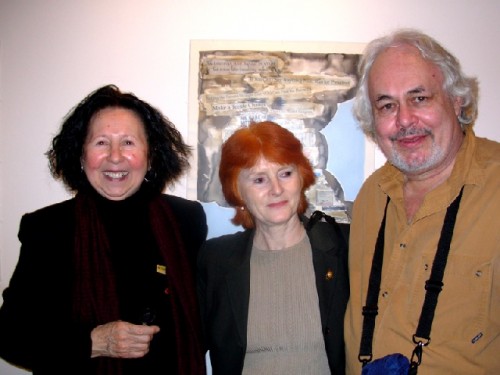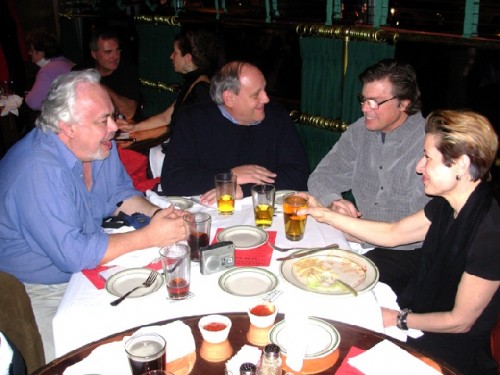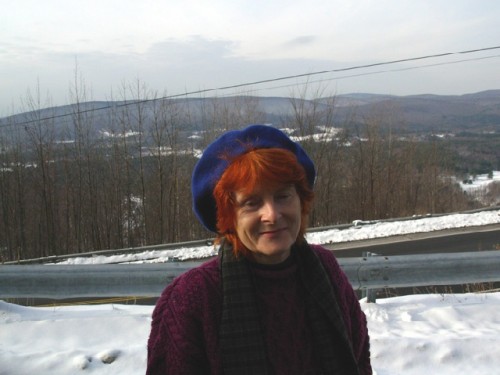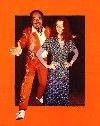Charles Giuliano: Beer and Burgers
Last Call for a Hardly Retiring Artist and Critic
By: Mark Favermann - May 03, 2007
For more than 25 years Charles Giuliano has taught art history for the New England School of Art & Design, and since its merger with Suffolk University, he has run the exhibition program. He was actually the only faculty member teaching at both institutions prior to their merger. For Suffolk he was associated with the Humanities Department for many years and also taught as a part of the Integrated Studies team.
Charles has also taught at Framingham State, Salem State, Clark University, University of Massachusetts, Lowell, Mass College of Art and Boston University among others.
Most fittingly, he will end this decades long association with the art school and university with an exhibition "Charles Giuliano: Last Call, a Retrospective" which will be on view in the NESAD at SU gallery from May 18 through June 28. There will be a reception and retirement party for the artist on Friday, May 18 from 6 to 8 PM.
Besides teaching and creating his own art, over the years, Giuliano has pursued a career covering the arts for many local, regional and national publications. In the 1960s he wrote reviews for Arts Magazine while living in New York. Returning to Boston he was an editor of the underground paper, The Avatar. Later, he was the art critic for Boston After Dark which is today known as The Phoenix. From there he moved on as an arts and music writer for The Boston Herald Traveler.
He was a Boston correspondent for Art News and for more than 25 years served as an editor and columnist for Art New England. There was also a long association with the daily Patriot Ledger as well as numerous other arts and music publications. Currently, he publishes the online magazines Maverick Arts and Berkshire Fine Arts.
Over the years, Giuliano has been known for his feisty, often contentious coverage of all aspects of the arts from fine arts, through jazz and rock, film, theatre and dance. It has earned him many loyal fans. In a long career, he has covered all of the major New England museums, their directors and curators. To say that Charles Giuliano is an individual of unique talents, personality and depth is clearly an understatement.
I have been acquainted with him for over 35 years. For 15 years, we were colleagues at Art New England, an art publication that many said was made better by our monthly and then bimonthly articles and columns. Charles wrote on the current art scene, and I wrote on architecture and design. He actually wrote for the publication for nearly twenty-five years.
Our critical paths crossed many times over the years starting with the founding of the Boston Visual Artists Union in 1972, through our years at Art New England and in a focused way in 2003, in planning my own exhibit at his gallery at Suffolk University's School of Art and Design. Interestingly, in 1974, I met Charles's wife, Astrid Hiemer, when I became a fellow at the Center for Advanced Visual Studies at MIT. She was the administrator at CAVS to the Center's director, artist Otto Piene. So, I have known Astrid as long as Charles.
Though our history is much longer, Charles and I have gotten to be close friends in only the last six or seven years. Our friendship is based upon a mutual love of art and everything that art enhances. This is art with a small a as well as a big A. I respect him and he respects me. We tend to not take ourselves too seriously nor the art world. If we did, we may tend to have both been rather miserable. We are either optimistic cynics, or at least pessimistic naives, both thinking that the world is generally good with a few dark clouds, road blocks, egomaniacs and a strangely large number of extremely lucky, less than talented individuals thrown in. Art conquers all.
Charles and I agree that life may not be fair, but art certainly makes it worth living or specifically worth seeing and feeling. Charles has described our friendship as a throwback to the Bloomsbury Group and the Algonquin Roundtable with the Cedar Bar thrown in. We talk to each other in a language of smartass art, architecture/design and world culture. I smile warmly when I think of Charles. From our numerous and often philosophical as well as witty emails and phone conversations, I assume that he thinks of me similarly.
In no particular order, Charles is a fascinating professor/teacher, a provocative artist, an astute curator, an encyclopedic critic, an excellent writer, a technical experimenter as well as devoted husband, historical chronicler, pioneer blogger, the first gonzo journalist (he invented the term that then Boston Globe journalist and friend, Bill Cardoso, passed along to Hunter Thompson) and good and generous friend. Charles is a big man with a somewhat shaggy, lion-like presence. At times he roars; at other times, he purrs. He is a natural storyteller. Art is his life, and his life is art.
With all this in mind, we settled in to share beer and burgers at his favorite pub located in the Park Plaza Hotel to discuss and ruminate about his life in art and the upcoming exhibit as he prepares to be rusticated to the foot of Mount Greylock, in Adams, Massachusetts in the picturesque Berkshire Mountains. Charles and Astrid are shortly leaving the hustle and bustle of Boston, their triple-decker in East Boston, and retiring to their mountain-view manse.
Being that Charles Giuliano is a consummate journalist, I prepared for my interview by developing twenty questions, but just not any twenty questions. I began by asking him a little bit about his parents and childhood.
Understanding that both of your parents were physicians, and you had a semi-yacht club upbringing, what were some of the defining moments of your childhood?
Both of my parents were doctors. My father was a surgeon and mom was a general practitioner (GP).The turning point in my life was when, late one night, I think that was about 16 because I could drive a car, my father insisted that I drive him to the hospital where I witnessed him perform a C-section. He was tired and asked if I would drive him from our house in Gloucester to Revere. I wanted to wait in the car but he insisted that I stand over his shoulder in the OR. Anyway, the baby popped out and I passed out. A couple of years later, I started Brandeis University as a pre-med student at the insistence of my parents. But during my freshman year, I flunked Chemistry and got an A in Art. When I stated that I wanted to major in art, Dad tried to beat some sense into me.
What got you interested in the arts as a child?
I was always an artist. Though my parents continued to push me away, from as early as I can remember, I loved the arts.
Was your sojourn at Boston Latin School life or career shaping?
Boston Latin School (oldest public high school in America founded in 1635) is a nightmare that I still am recovering from. The horrors and rewards of a truly classical education still haunt me. We were expected to study at least three hours a night seven nights a week. It was mind-boggling.
How would you describe your time at Brandeis University? What was a nice Italian-American boy doing at a predominantly Jewish institution?
My time at Brandeis was a phenomenal experience. It was a golden time of sex, drugs and rock and roll. I went there because I wasn't accepted by any Ivy college that I applied to. Brandeis was arguably the most radical school in America at the time. During the 60s half the FBI most wanted list, included Brandeis grads Angela Davis, Abbie Hoffman, Susan Saxe and Kathy Powers.
I flunked chemistry but my brilliant lab partner was a member of the Weatherpeople and blew up a bank in New York. Compared to their radical political positions I prefer to think that Brandeis radicalized me as an activist in the arts.
Being a student at Brandeis was highly competitive and serious. Somehow I got recruited as the heavyweight by the amazing wrestling coach, Manny Maier, who had two doctorates and lectured us on Herman Hesse as we drove to matches. I had never before wrestled and lost every time but it was a great experience to learn that there were guys out there bigger and stronger than I was. The coach was a great mentor, and I much regret not having stayed in touch with him. Brandeis had an interesting policy for art majors. Studio majors (me) minored in art history and art historians minored in studio.
That would basically form who I later became combining creating and writing about art. Nobody can teach you to be a critic, it just happens. But Brandeis gave me the proper tools to make my own decisions. The Renaissance scholar, Creighton Gilbert, was an enormous influence. He was the greatest professor I ever studied with.
Do you have any regrets about your childhood?
I really can't discuss this in a short amount of time. My father was exceedingly strict. I reacted to this in many ways and many times. But all in all I have no real regrets.
Do you have regrets about your relationship to your parents?
Perhaps, I regret that I couldn't have been closer to both of my parents. But, this was a function of their personalities as well as mine. My relationship with my mother was particularly complex. We had a love/hate relationship. My mother as a successful physician and a strong woman was the female role model for the entire extended family. She was incredibly bright, highly accomplished, yet controlling. She became the matriarch of the extended family.
She possessed a sharp tongue and a wit, but had an enormous sense of humor and sensitivity to the trials and suffering of others. My father was brilliant but aloof and stern while Mom was not on his professional level but had real street smarts and common sense.
How do you think that you rebelled against your parents?
Of course, I rebelled. That was my personality and I certainly a part of the times. In a way, they were perfect foils for rebellion-from the WWII generation, strict, accomplished and at times incredibly rigid.
Are you still rebelling?
I have never done well with authority. Institutions like museums often rub me the wrong way. No, individuals at institutions often rub me the wrong way. I am a 60's person in every sense of the word. Now in my own 60's, it is weird to think that now I am the person others, like my students, want to rebel against.
Art and thoughtful criticism have defined your life. Do you have any regrets?
Regrets? No, I fought tooth and nail for a life in the arts. I am grateful that I was able to prevail. The thought of not living this life goes beyond my imagination. Living without a safety net defines me as a person.
You married rather late in life (in your 50's). Do you care to comment why?
There were many wonderful women in my life, yet until I was in my 50's, I offered no prospects for the quality of life that they wanted and deserved. Ultimately I was more committed to having art in my life, with all of the risk and uncertainty that entails, than in sustaining a relationship.
By the time, I met and got serious with Astrid, I was finally ready to make a complete commitment to her. Even then my best friends warned her that I was high maintenance and a project. During our first week together I put all of my faults on the table. She simply asked was I willing to change? We have been together ever since, and she would probably say that I am still a work in progress.
We have known each other for over 30 yrs, but became true friends in the last few years. I enjoyed your writing for decades. Do you think eccentrics attract or just a few overlook each others' quirks and foibles?
I view us as a couple of rare comrades in arms. We both fight the good fight. We have a uniquely uninhibited relationship that allows discourse and debate about anything and everything. Our communication is humorous, witty and occasionally raunchy and irreverent. It fits into a deep longing to have something like the artistic dialogue of the Bloomsbury Group. How great it would have been to be a part of the Roundtable at the Algonquin Hotel or one of the Lake Poets. That kind of peer dialogue is so important and difficult to come by so that is what I have enjoyed about our literary/artistic relationship.
You have been an itinerant academic, teaching at several institutions. Two multiple questions: A. Are students very different from each other from institution to institution? B. Have students changed in the last few decades? Last few years? How?
Interesting questions. As I have never taught at an elite university or college, I have never been exposed to the cream of the crop. So, the answer is both yes and no. There are many similarities in the students that I have taught. My goal has been always to reach students with interest and potential. I enjoy the ongoing discovery of these hidden treasures.
Having a real impact on young talent can be energizing. This tended to make me better as a discussion leader and as a teacher/professor. Over the years in virtually every institution and classroom there is always a small but significant critical mass of students who are capable of doing the best level of work at any of the top universities. It was always a great privilege and pleasure to write their letters of recommendation and help them get to the next step in their education and careers.
In response to the second part of the question, things have changed. There is too little experimentation and critical thinking among students. Many feel entitled to good grades just for showing up. This is a serious threat to creativity and free expression. Too often there is a lack of adequate training in writing and communication. The phenomenon of MCAS plays a role in that as schools have been forced to prepare for the tests rather than focusing on critical thinking and developing writing skills. At Suffolk there is a strong emphais on developing writing throughout the curriculum. Many kids grow up in an entitled environment and often blame others rather than accept responsibility.
As professors it is important to provide a transition from the applause they are used to and prepare them for the real world when they move on from the academy. In that sense I always tried to provide tough love. There were always those who really appreciated and enjoyed the straight talk. A lot of times, particularly in Humanities courses like the Freshman seminars I taught this year, the class room was a constant challenge. But what a blast. At the start of a class you just never knew what to expect. By the end of the semester you could really feel the growth and change as discussion and debate got ever more lively. I will truly miss that energy and challenge.
Try explaining why God is dead and that existence precedes essence. They complained about reading Heart of Darkness but it started to make sense when we then viewed Apocalypse Now and compared the book to the film. It was a great experience to do that with them. I also got tickets (through a stipend provided for the Freshman Seminars) and sent them to Huntington Theatre to see Radio Golf the last play by August Wilson. Those were wonderful opportunities for them as well as for me.
How would you describe your plans for retirement? Assuming that this is your rustication, your literal going out to pasture to the foot of Mount Greylock, how will the urbane city boy, man, old goat deal with this concentrated fresh air? As you know, the Berkshires are full of cultural institutions and events. Astrid and I will take full advantage of everything that we possibly can. This should make up for any cultural lag left by leaving Boston.
We will continue to travel to NYC, drive around the U.S and spend more time in Europe and Asia. We would like to house swap with other artists internationally.. Actually, we are "retiring" so that we can finally get some creative work done. It's tough to take on projects and travel when you are confined by the academic calendar. So as long as our health and energy remain vital we are free from those restraints."
In your late 50's and early 60's, you were a pioneer of cyber blogging. Your Maverick-Arts and now Berkshire Fine Arts are fresh, thoughtful approaches to art criticism and reporting which the kids are attempting but not quite as well. How did you get it, the shift from print to on line media, when others of your contemporaries just didn't and still don't? By the way, you recently told me that Berkshire Fine Arts and Maverick Arts are getting up to 30,000 visits a month. That is extremely impressive.
This month (April, 2007) has been our strongest ever with 37,000 visits for the combined sites. My involvement started about 8 years ago. I was tired of being fired by publications making cultural cuts. Also I was sick of dealing with too many incompetent editors. That was increasingly a factor when the publisher/ editor of Art New England, Carla Munsat, with whom we worked closely and productively gradually was around less and less.
Under Carla, I was guest editor for a number of issues and always enjoyed those opportunities. For one issue I did a cover story on the Starn Twins. I spent a weekend in New York with Gerard Malanga, an old friend, resulting in collaboration on Andy Warhol; with an Edie Sedgwick "Screen Test" shot from Gerard's archive as the cover. That piece made it into a lot of Warhol bibliographies.
There was another issue celebrating the 100th anniversary of the Provincetown Art Association and Museum. You and I often complained about Miles Unger during his time as editor of Art New England. That was followed by a regime change during and after the brief tenure of Carl Belz when his daughter was a partner in new ownership. Carl had recently left as director of the Rose Art Museum and had no journalistic experience prior to taking over as editor of the publication. So that proved to be a disaster for those of us, columnists, editors and feature writers who had many years of relationship with the publication. The new owners were entitled to make changes but I don't feel they have been for the better. There is a new editor Ellen Howards so we will have to wait and see what impact that has.
In the 90's, I was approached by a pioneering Microsoft website, Sidewalk, to be the Boston art critic. There were several national versions of Sidewalk. At the time I was computer illiterate. In order to do the work, I learned to use a computer and send my reviews by e mail. Sidewalk was way ahead of its time and I had a terrific editor, one of the best every, in Linda Tischler. She brought me kicking and screaming into the computer age. It was a blast writing for her and it actually paid well. I got addicted to seeing my stuff on line. When Sidewalk folded after a couple of great years I was depressed but eventually decided to launch my own website, maverick-arts.com.
At first I had no idea how to reach an audience. But almost immediately there was a small but loyal following. Now, in hindsight, what I was doing makes perfect sense. Also I could write about anything that was of interest and I didn't have to run it by publishers and editors. As an artist, I am fascinated by new ideas, so there was a logical progression toward the internet. Putting together berkshirefinearts.com in the past year has given me greater range as an editor, writer and arts activist. I have enlisted gifted contributors to create a growing electronic cultural magazine. The dramatic growth in numbers of readers, exceeding most print arts journals, indicates that we are doing something right. It is great fun to be in the thick of things.
Currently, we still cannot comfortably take a blog to read when we go to the bathroom. So, printed material still has an advantage for readability. How do you view the future?
Print is doomed. Just look at the fall in readership and the quality of writing for traditional newspapers. Why cut down all those trees when you can communicate for free on line? Yes, I love to read the daily papers but look around and you will see kids everywhere with their laptops. How many of them even bother to read a newspaper?
I would also say that books and libraries are doomed. When I assign research papers, for example, some students just surf the web. I have to tell them that quoting Wikepedia is not an acceptable scholarly source. They are stunned. Also too many Americans form political opinions by watching Fox TV or tuning in to talk radio. Americans have been force fed tons of misinformation. To discuss that point gets you branded as a liberal. So be it. Live free or die.
Your current exhibit at Suffolk is your valedictory, your Good-Bye Mr. Chips show. Was it hard to put together or was it a pleasure? Like Frank Sinatra, did you do it your way?
Frank Sinatra will be in the show actually. This show is interesting in that none of the pictures were meant to be more than photo illustrations for articles--snapshots, so to speak, of critical subjects. They were never intended as art pieces. Yet in reviewing them, I recognized a personal, historical and cultural thread. So, I started to edit file cabinets packed with slides and negatives cleaning up and printing them using Photoshop. I built a darkroom in the basement but haven't used it in years. You don't need to use wet chemistry anymore. The 130 or so, 13x19" prints in the show reveal all aspects of what I have covered in the past few decades.
I don't necessarily see this show as a last picture show, but more like archiving a vast body of work and making it available as a resource for myself and others. It captures individuals and moments that are no longer with us. Some of the images, however, may be as new as yesterday. What is thrilling to me is that pictures shot in the 70's and 80's that were underexposed, grainy and otherwise poor visually can be transformed by 21st Century technology. For me the show is the end of one chapter and the beginning of another. More than the usual nostalgia it represents a real statement.
Your professional life was a scattered but meaningful approach to cultural criticism in the best possible sense. There has always been a bit of joy and wonder in your approach. You are totally cynically optimistic. Does this speak to your lifestyle? Your upbringing? Your wife? Or your personal naivety?
All of the above. My life and career have gone with a beat to a different drummer. I have always followed the road less traveled. The beaten path never had much attraction for me. But without Astrid I might not have survived intact enough to enjoy this wonderful moment. It makes an enormous difference when you share your life with someone you love. The odds are you live better and longer.
To be recognized as an interesting artist or as a teacher/professor or as a critic as your life-affirming contribution, which one?
Realistically, most of our best accomplishments are tiny blips on the radar screen. I hope that my efforts have allowed me to teach and influence a handful of others to appreciate and love art as much as I do. To expect more would be quite arrogant.
Tell me three of your best memories from your career.
That's easy, but probably not limited to the following: 1.At Woodstock, I sat in the mud. 2.Hung out with Miles Davis and heard early Jimi Hendrix when he was Jimmy James with Curtis Knight and the Flames at the Cheetah in New York. 3. Coined the word gonzo.

